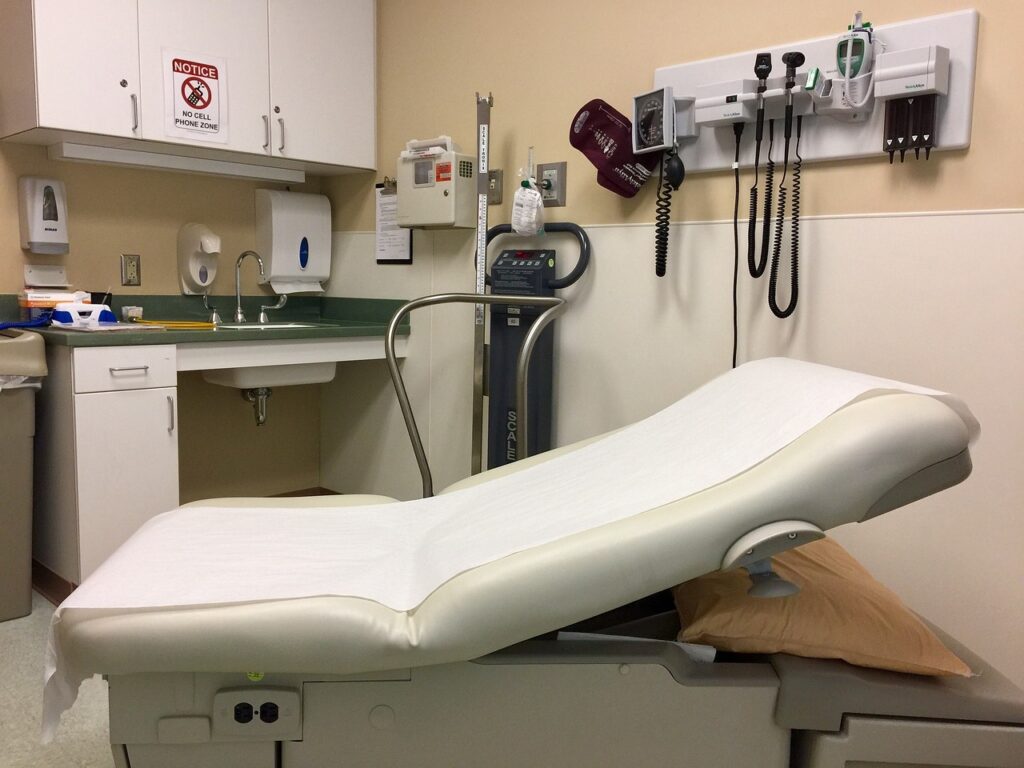
Healthcare management degrees are specialized programs that combine business and healthcare knowledge to prepare individuals for leadership roles in the healthcare industry. These degrees focus on developing skills in areas such as healthcare policy, finance, strategic planning, and organizational management. With the ever-growing demand for qualified healthcare administrators, these degrees offer a pathway to a rewarding and impactful career in healthcare management.
In today’s complex and rapidly evolving healthcare industry, effective management is crucial for the delivery of quality patient care and the overall success of healthcare organizations. Healthcare managers play a vital role in ensuring the efficient operation of healthcare facilities, managing budgets, implementing policies, and coordinating with healthcare professionals. By pursuing a healthcare management degree, individuals can acquire the knowledge and skills necessary to navigate the challenges of this dynamic field.
This guide is designed for individuals who are interested in pursuing a career in healthcare management or those looking to advance their education in the field. It provides valuable information about the different types of healthcare management degrees available, the benefits of pursuing such a degree, and the various career opportunities that exist within the field. Whether you are a recent high school graduate or a working professional seeking a career change, this guide will provide you with the necessary insights to make informed decisions about your education and career path in healthcare management.
Schools Offering Healthcare Management Degrees

Healthcare Management Degrees from Liberty University
B.S. in Business Administration: Healthcare Management; MBA in Healthcare Management; DBA in Healthcare Management

Healthcare Management Degrees from Walden University
BS in Healthcare Management; Doctor of Healthcare Management

Healthcare Management Degrees from Penn Foster
Health Care Management Associate Degree
Types of Healthcare Management Degrees
Associate’s Degree in Healthcare Management
An associate’s degree in healthcare management is a two-year program that provides students with a foundational understanding of healthcare systems and management principles. This program is designed to prepare individuals for entry-level positions in healthcare administration and management.
The curriculum for an associate’s degree in healthcare management typically includes courses in healthcare administration, healthcare ethics, medical terminology, healthcare law and regulations, healthcare finance, and healthcare information systems. Students may also take general education courses in subjects such as English, mathematics, and social sciences.
Career Prospects and Job Opportunities
Graduates with an associate’s degree in healthcare management may find employment in various healthcare settings, such as hospitals, clinics, long-term care facilities, and physician practices. They may work in roles such as healthcare administrators, medical office managers, or health information technicians. While an associate’s degree can provide entry-level opportunities, individuals with higher-level degrees may have better advancement prospects in the field.
Bachelor’s Degree in Healthcare Management
A bachelor’s degree in healthcare management is a four-year program that offers a more comprehensive and in-depth study of healthcare administration and management. This degree is suitable for individuals who aspire to leadership positions in the healthcare industry.
The curriculum for a bachelor’s degree in healthcare management typically includes a combination of healthcare-specific courses and business courses. Students can expect to study subjects such as healthcare policy and economics, healthcare quality improvement, strategic management, human resources management, healthcare marketing, and healthcare information technology.
Career Prospects and Job Opportunities
Graduates with a bachelor’s degree in healthcare management have a wide range of career opportunities in healthcare organizations, including hospitals, healthcare consulting firms, insurance companies, and government agencies. They may work in roles such as healthcare administrators, healthcare consultants, healthcare project managers, or healthcare policy analysts. A bachelor’s degree can provide a strong foundation for career growth and advancement in the field.
Master’s Degree in Healthcare Management
A master’s degree in healthcare management is a graduate-level program that offers advanced knowledge and skills in healthcare administration and leadership. This degree is suitable for individuals who want to pursue top-level management positions in healthcare organizations.
The curriculum for a master’s degree in healthcare management typically includes courses in healthcare leadership, healthcare finance, healthcare policy and ethics, healthcare informatics, healthcare operations management, and strategic planning. Students may also have the opportunity to specialize in areas such as healthcare quality management or healthcare information systems.
Career Prospects and Job Opportunities
Graduates with a master’s degree in healthcare management can pursue high-level management positions in healthcare organizations, such as healthcare executives, chief operating officers, or healthcare department directors. This advanced degree can also open doors to consulting opportunities or academic positions in healthcare administration.

MBA in Healthcare Management
An MBA in Healthcare Management is a graduate-level degree program that focuses on developing business and management skills specifically for the healthcare industry. This program typically combines core MBA coursework with specialized healthcare courses to provide students with a comprehensive understanding of both business principles and healthcare management practices.
Students in an MBA in Healthcare Management program learn about various aspects of healthcare management, including healthcare finance, healthcare law and ethics, healthcare policy, healthcare information systems, and healthcare operations. The goal of the program is to prepare students for leadership roles in healthcare organizations, such as hospitals, clinics, long-term care facilities, and health insurance companies.
Online Healthcare Management Degree Programs
When considering a healthcare management degree, many individuals opt for online programs due to the numerous benefits they offer.
- Flexibility: Online healthcare management degree programs provide flexibility in terms of scheduling and location. Students can access course materials and lectures at their convenience, allowing them to balance their studies with work and other commitments. This flexibility is particularly beneficial for adult learners and non-traditional students who may have other responsibilities.
- Convenience: Online programs eliminate the need to commute to a physical campus, saving students both time and money. With online learning, students can study from the comfort of their own homes or any location with internet access. This convenience allows individuals to pursue a healthcare management degree without disrupting their current lifestyle or location.
- Access to a Wide Range of Programs: Online education provides access to a diverse range of healthcare management degree programs. Students can choose from various institutions and find a program that aligns with their career goals and interests. This wide range of options allows individuals to select the program that best suits their needs, whether it be a bachelor’s, master’s, or even a certificate program.
- Networking Opportunities: Online healthcare management programs often include opportunities for students to interact and collaborate with professionals in the field. Virtual discussions, group projects, and online forums provide a platform for networking and knowledge sharing. These connections can be valuable for future career opportunities and professional growth.
Benefits of Pursuing a Healthcare Management Degree
Pursuing a healthcare management degree offers individuals the opportunity to make a positive impact on healthcare delivery. With the knowledge and skills gained through a healthcare management program, graduates can contribute to improving the quality and efficiency of healthcare services.
By understanding the complexities of the healthcare industry and the challenges it faces, healthcare management professionals can implement effective strategies and initiatives to enhance patient care, streamline processes, and optimize resource allocation. They can work towards improving healthcare outcomes and ensuring that patients receive the highest level of care.
High Job Demand and Competitive Salaries
Healthcare management is a rapidly growing field with high job demand and competitive salaries. As the healthcare industry continues to expand and evolve, there is an increasing need for skilled professionals who can effectively manage healthcare organizations and navigate the complex healthcare landscape.
With a healthcare management degree, individuals can pursue a variety of career paths in healthcare administration, hospital management, healthcare consulting, and more. These positions often come with attractive salary packages and benefits, reflecting the importance and demand for qualified healthcare management professionals.
Advancement Opportunities and Career Growth
A healthcare management degree opens up numerous advancement opportunities and the potential for career growth. Graduates can start their careers in entry-level positions and progressively move up the ranks to higher-level management roles.
With experience and additional education, such as pursuing a master’s degree in healthcare administration, individuals can qualify for leadership positions in healthcare organizations. They can take on roles that involve strategic planning, policy development, financial management, and decision-making.
Furthermore, healthcare management professionals have the opportunity to specialize in specific areas of healthcare, such as healthcare informatics, health policy, or quality improvement. This specialization can further enhance career prospects and open doors to new and exciting opportunities within the field.
Overall, pursuing a healthcare management degree offers individuals the chance to make a positive impact on healthcare delivery, access high job demand and competitive salaries, and enjoy advancement opportunities and career growth in the dynamic healthcare industry.

How to Choose a Healthcare Management Degree Program
When choosing a healthcare management degree program, there are several important factors to consider. These factors will help you make an informed decision and ensure that the program aligns with your career goals and aspirations.
Factors to consider when selecting a program
- Online or in-person learning
One of the first decisions to make is whether you prefer to pursue your degree online or in-person. Online programs offer flexibility and convenience, allowing you to study at your own pace and from the comfort of your own home. On the other hand, in-person programs provide a more traditional classroom experience and the opportunity for face-to-face interaction with professors and classmates. Consider your learning style, schedule, and personal preferences when deciding between online and in-person learning.
- Subject focus and specialization options
Another important factor to consider is the subject focus and specialization options available within the healthcare management program. Different programs may have a specific emphasis, such as healthcare policy, finance, or strategic planning. Think about your interests and career goals to determine which specialization aligns with your aspirations. Additionally, consider whether the program offers opportunities for internships or hands-on experience in your chosen field.
- Cost and affordability
Cost is a significant consideration for many students. Research the tuition and fees associated with each program you are considering, as well as any additional expenses such as textbooks or technology requirements. Compare the costs of different programs and evaluate whether they align with your budget. Additionally, explore financial aid options, scholarships, and grants that may be available to help offset the cost of your education.
- Career goals and desired industry
Your career goals and desired industry should also play a role in your decision-making process. Consider the specific career paths and job opportunities that are available to graduates of each program. Look for programs that have strong connections to the healthcare industry and offer networking opportunities or job placement assistance. Additionally, research the demand for healthcare management professionals in your desired industry to ensure that there are ample opportunities for employment after graduation.
- Time to completion and flexibility
Finally, consider the time to completion and flexibility of each program. Some programs may offer accelerated options that allow you to earn your degree in a shorter amount of time. Others may have a more flexible schedule, allowing you to balance your studies with work or other responsibilities. Think about your time commitments and how they align with the program’s structure and requirements.
By carefully considering these factors, you can choose a healthcare management degree program that meets your needs and sets you on the path to a successful career in healthcare management.

Accreditation and Quality Assurance
Choosing an accredited healthcare management program is crucial for ensuring the quality and credibility of your education. Accreditation is a process through which educational institutions and programs are evaluated by an external organization to ensure that they meet certain standards of quality and excellence. By choosing an accredited program, you can be confident that you are receiving a high-quality education that meets industry standards.
Accreditation serves as a mark of quality and can have several benefits for students. Firstly, it ensures that the program has undergone a rigorous evaluation process and meets specific criteria set by accrediting bodies. This means that the curriculum, faculty, resources, and overall educational experience have been reviewed and deemed to be of high quality.
Additionally, many employers and professional organizations value accreditation when hiring or recognizing professionals in the healthcare management field. Graduating from an accredited program can enhance your credibility and increase your chances of securing desirable job opportunities. It also demonstrates your commitment to professional development and lifelong learning.
Accrediting Bodies and Their Role in Ensuring Program Quality in Healthcare Management
Accrediting bodies play a crucial role in ensuring the quality and consistency of healthcare management programs. These organizations evaluate and accredit educational institutions and programs based on specific standards and criteria. Some of the prominent accrediting bodies for healthcare management programs include:
- Commission on Accreditation of Healthcare Management Education (CAHME): CAHME is the leading accrediting body for graduate programs in healthcare management. It evaluates and accredits programs based on criteria such as curriculum quality, faculty qualifications, student outcomes, and program resources.
- Accreditation Council for Business Schools and Programs (ACBSP): ACBSP is a global accrediting body for business programs, including healthcare management. It evaluates programs based on criteria such as teaching and learning processes, faculty qualifications, and continuous improvement efforts.
- Association to Advance Collegiate Schools of Business (AACSB): AACSB is another prestigious accrediting body for business programs. While it accredits a wide range of business disciplines, including healthcare management, its accreditation signifies excellence in education and continuous improvement.
These accrediting bodies ensure that healthcare management programs adhere to high standards of quality and provide students with a well-rounded education. When considering a healthcare management program, it is important to verify if it is accredited by one or more of these recognized accrediting bodies.
By choosing an accredited healthcare management program, you can be confident that you are receiving a quality education that meets industry standards. Accreditation enhances your credibility and opens doors to exciting career opportunities in the healthcare management field.

Careers and Salaries for Healthcare Management Graduates
In the dynamic and rapidly evolving field of healthcare management, graduates have a wide range of career opportunities. Healthcare management professionals play a crucial role in ensuring the smooth operation and effective delivery of healthcare services. They are responsible for managing healthcare facilities, developing and implementing policies, and overseeing the financial and administrative aspects of healthcare organizations.
Some potential career paths for healthcare management graduates include:
- Healthcare Administrator: Responsible for managing the operations of healthcare facilities such as hospitals, nursing homes, and clinics.
- Hospital Manager: Specifically focused on managing the operations of hospitals.
- Healthcare Consultant: Provides expertise and guidance to healthcare organizations to help them improve their operations, increase efficiency, and enhance patient care.
Job Prospects and Salary Ranges for Healthcare Management Professionals
The job prospects for healthcare management professionals are promising, with a growing demand for skilled individuals in the field. According to the Bureau of Labor Statistics, employment of medical and health services managers is projected to grow 28 percent from 2022 to 2032, much faster than the average for all occupations. The salary range for healthcare management professionals can vary depending on factors such as education, experience, location, and the size of the healthcare organization. According to the Bureau of Labor Statistics, the median annual wage for medical and health services managers was $104,830 as of May 2022. However, salaries can range from around $58,680 for entry-level positions to over $200,000 for top executives in large healthcare organizations.
Examples of job titles in healthcare management include:
- Healthcare Operations Manager
- Health Information Manager
- Healthcare Policy Analyst
By pursuing a healthcare management degree, individuals can open doors to a rewarding career in a field that combines business acumen with a passion for improving healthcare delivery. Whether it’s managing healthcare facilities, consulting on healthcare strategies, or shaping healthcare policies, healthcare management professionals play a vital role in shaping the future of healthcare.
Get Your Degree in Healthcare Management Today
Healthcare management degrees provide individuals with the knowledge and skills necessary to thrive in the dynamic and rapidly evolving healthcare industry. These degrees open doors to a wide range of career opportunities, from entry-level positions to leadership roles. With a healthcare management degree, you can make a positive impact on patient care, improve healthcare operations, and contribute to the overall success of healthcare organizations.
If you’re interested in a career in healthcare management or looking to advance your education in the field, now is the time to take action.
Take the next step towards your healthcare management degree by requesting information from accredited colleges and universities offering a degree in healthcare management.
